Garden Fencing Luton: Enhancing Your Outdoor Space
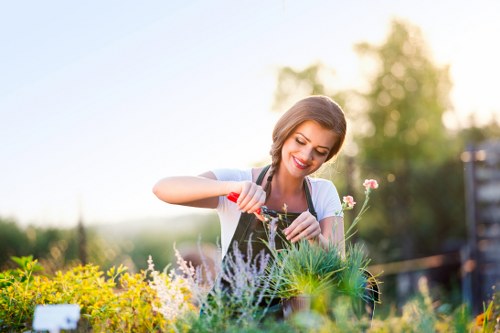
Having a well-designed garden fence not only adds value to your property but also provides privacy, security, and aesthetic appeal. If you live in Luton, selecting the right garden fencing solution is essential to complement your home and landscape.
In this article, we’ll explore various aspects of garden fencing in Luton, including types of fences, materials, installation tips, and maintenance advice. Whether you’re looking to upgrade your current fence or install one for the first time, this guide will help you make an informed decision.
Understanding the different garden fencing options available in Luton can be overwhelming, but with the right information, you can choose a fence that meets your needs and enhances your garden’s beauty.
Types of Garden Fencing
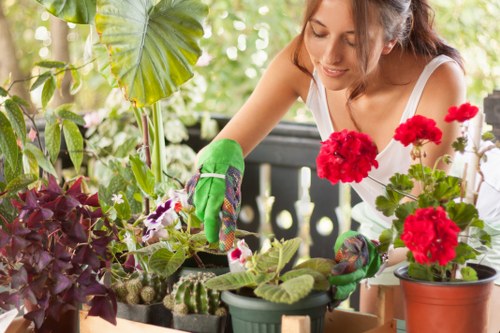
When it comes to garden fencing in Luton, there are several types to consider. Each type has its own benefits and is suitable for different purposes.
1. Wooden Fences: Wooden fences are a popular choice due to their natural appearance and versatility. They can be painted or stained to match your garden’s aesthetic and are excellent for creating a warm and inviting atmosphere.
2. Vinyl Fences: Vinyl fences are known for their durability and low maintenance. They resist weathering, pests, and rot, making them a long-lasting option for garden fencing in Luton.
Metal Fences
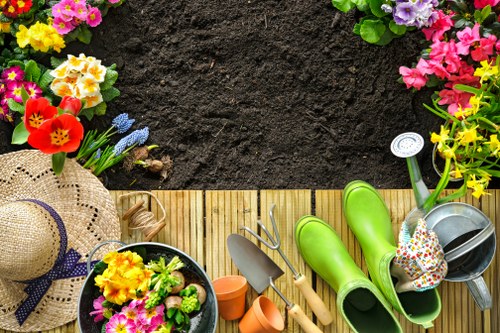
Metal fences, including aluminium and wrought iron, offer a sleek and modern look. They are sturdy and can provide both security and elegance to your garden. Metal fences are also customizable with decorative elements to suit your style.
4. Composite Fences: Composite fencing combines wood fibers and plastic, offering the look of wood with enhanced durability. It is resistant to insects and decay, making it a practical choice for Luton gardens.
[p]5. Palisade Fences:Palisade fences are made from vertical or angled boards, creating a robust and secure barrier. They are ideal for those seeking added privacy and protection for their outdoor space.
Choosing the Right Material
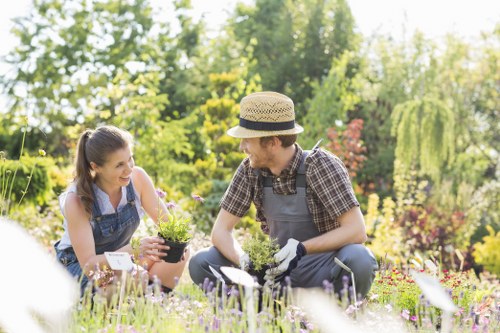
Selecting the right material for your garden fence is crucial. Here are some factors to consider when choosing materials for garden fencing in Luton:
- Durability: How well does the material withstand weather conditions?
- Maintenance: How much time and effort are you willing to invest in maintaining the fence?
- Aesthetics: Does the material complement your garden’s design and your home’s exterior?
- Cost: What is your budget for the fencing project?
- Purpose: Do you need the fence primarily for privacy, security, or decoration?
Considering these factors will help you choose a material that not only looks great but also serves its intended purpose effectively.
Wood
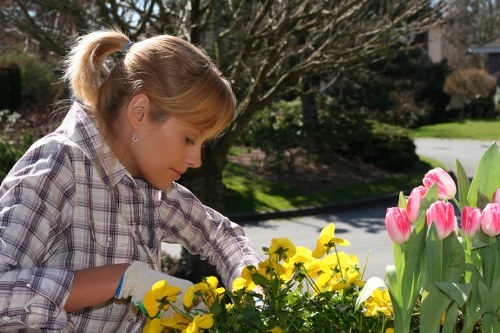
Wood is a versatile and classic choice for garden fencing. It can be easily customized with paint or stain and offers a natural look that blends well with any garden setting. However, wood requires regular maintenance to prevent rot and damage from pests.
Vinyl: Vinyl fencing is resistant to weather and requires minimal maintenance. It is available in various styles and colors, making it easy to find an option that fits your garden’s aesthetic.
Metal: Metal fences provide strength and security. They are ideal for larger gardens or areas where additional protection is needed. Metal fences can also be styled in traditional or contemporary designs.
Installation Tips
Proper installation is key to ensuring the longevity and effectiveness of your garden fence in Luton. Here are some tips to help you through the process:
- Measure Your Space: Accurate measurements will help you determine how much material you need and where to place the fence.
- Check Local Regulations: Before installing a fence, ensure that you comply with local building codes and zoning laws in Luton.
- Prepare the Ground: Clear the area where the fence will be installed and ensure the ground is level.
- Use Quality Materials: Invest in high-quality materials to ensure your fence stands the test of time.
- Consider Professional Help: If you’re not confident in your DIY skills, hiring a professional can ensure a flawless installation.
Following these tips will help you achieve a successful fence installation that enhances your garden’s beauty and functionality.
DIY vs Professional Installation
Deciding whether to install your garden fence yourself or hire a professional depends on your skill level, budget, and the complexity of the project.
- DIY Installation: Ideal for those with some handyman experience and the necessary tools. It can save money but may require more time and effort.
- Professional Installation: Ensures a high-quality finish and can save you time. Professionals also handle any unexpected issues that may arise during installation.
Consider your personal circumstances and the specific requirements of your garden when making this decision.
Maintenance and Care
Maintaining your garden fence is essential for ensuring its longevity and appearance. Here are some maintenance tips for different types of garden fencing in Luton:
- Wood: Regularly inspect for rot, pests, and weather damage. Apply paint or stain every few years to protect the wood.
- Vinyl: Clean with soap and water to remove dirt and prevent mold growth. Inspect for cracks or damage periodically.
- Metal: Check for rust or corrosion and apply protective coatings as needed. Tighten any loose bolts or screws.
- Composite: Clean with a mild detergent and rinse with water. Avoid using harsh chemicals that can damage the material.
Regular maintenance not only keeps your fence looking good but also extends its lifespan, saving you money in the long run.
Seasonal Maintenance
Different seasons require different maintenance approaches:
- Spring: Inspect your fence for any winter damage and make necessary repairs.
- Summer: Keep the fence clean and check for signs of pests or weather-related wear.
- Autumn: Prepare the fence for winter by sealing any gaps and applying protective coatings.
- Winter: Protect your fence from heavy snow and ice. Clear debris that may accumulate.
Adapting your maintenance routine to the seasons ensures your garden fence remains in optimal condition year-round.
Cost Considerations
The cost of garden fencing in Luton can vary widely based on materials, size, and installation method. Here are some factors that influence the overall cost:
- Material: Wooden fences are generally more affordable, while metal and composite fences tend to be pricier.
- Size: Larger gardens require more materials, increasing the total cost.
- Labor: Professional installation services add to the overall expense but ensure quality work.
- Design: Customized or decorative fences with intricate designs will cost more than basic styles.
Budgeting for your garden fence involves considering all these factors to ensure you get the best value for your investment.
Budget-Friendly Options
If you’re working with a tight budget, consider these cost-effective garden fencing options:
- Chain-Link Fences: Affordable and easy to install, chain-link fences provide basic security and visibility.
- Reclaimed Wood: Using reclaimed or recycled wood can reduce costs while adding a unique character to your garden.
- Simple Designs: Opting for straightforward fence designs without intricate details can save money on materials and labor.
These options allow you to achieve a functional and attractive garden fence without breaking the bank.
Local Relevance: Nearby Areas to Luton
Luton is surrounded by several nearby areas, each offering unique features for garden fencing. Here are some of the closest areas to Luton:
- Leagrave: Just north of Luton, known for its residential neighborhoods and family-friendly environment.
- Stopsley: Located to the west, offering a mix of homes and local parks.
- Park Street: East of Luton, featuring beautiful gardens and green spaces ideal for fencing solutions.
- Brecil: A small area with a close-knit community and quaint homes.
- Redbourn: South of Luton, known for its picturesque countryside and spacious properties.
- Houghton Regis: Further southeast, offering a blend of modern and traditional homes.
- Marsh Farm: West of Luton, featuring contemporary housing with varying garden sizes.
- Charlton: North-east of Luton, a suburban area with diverse architectural styles.
- Eartham: Located west, known for its scenic views and tranquil environment.
- Studham: A rural area with expansive gardens, perfect for larger fencing projects.
Each of these areas has its own distinct characteristics, making them unique when it comes to garden fencing needs and styles.
Choosing Local Professionals
Selecting local garden fencing professionals in Luton ensures that you work with experts who understand the local climate and regulations. Local companies are more likely to have a portfolio of projects in nearby areas, giving you confidence in their ability to deliver quality work tailored to your specific needs.
Additionally, local businesses can offer personalized service and quicker response times, making the fencing process smoother and more efficient.
Benefits of Garden Fencing
Installing a garden fence offers numerous benefits for homeowners in Luton:
- Privacy: A fence provides a barrier that keeps your outdoor activities private from neighbors and passersby.
- Security: Fencing can deter unwanted visitors and reduce the risk of break-ins.
- Boundary Definition: Clearly marks the boundaries of your property, preventing encroachments.
- Enhances Curb Appeal: A well-designed fence can significantly improve the look of your home and garden.
- Safety for Children and Pets: Keeps children and pets safely contained within your garden.
- Garden Protection: Protects your plants and landscaping from animals and harsh weather conditions.
- Increases Property Value: A quality fence can boost the overall value of your property.
These benefits make garden fencing a worthwhile investment for any homeowner looking to improve their outdoor living space.
Environmental Impact
Choosing eco-friendly fencing materials can reduce your garden’s environmental footprint. Sustainable options like recycled metal, sustainably sourced wood, and composite materials are great choices for environmentally conscious homeowners.
- Recycled Metal: Utilizes recycled materials, reducing waste and conserving resources.
- Sustainably Sourced Wood: Ensures that the wood comes from responsibly managed forests.
- Composite Materials: Made from a blend of wood fibers and recycled plastics, offering durability without the need for new resources.
Opting for these materials supports sustainability and contributes to a healthier environment.
Trends in Garden Fencing
Staying updated with the latest trends in garden fencing can help you choose a style that is both modern and timeless. Here are some current trends in Luton:
- Minimalist Designs: Simple and clean lines that provide functionality without overwhelming the garden’s natural beauty.
- Mixed Materials: Combining different materials like wood and metal to create unique and visually appealing fences.
- Vertical Gardens: Incorporating greenery into the fence design for a natural and refreshing look.
- Decorative Panels: Adding intricate patterns or decorative elements to enhance the fence’s appearance.
- Colorful Finishes: Using vibrant or bold colors to make the fence stand out and complement the garden’s palette.
- Smart Fencing: Integrating technology, such as smart locks or lighting, for added convenience and security.
These trends offer a variety of options to personalize your garden fence and keep it stylish and functional.
Integration with Landscaping
Integrating your garden fence with the overall landscaping enhances the beauty and cohesiveness of your outdoor space. Consider the following ideas:
- Green Fences: Incorporate plants and vines into the fence design to create a vibrant and living barrier.
- Pathways and Gates: Design pathways and gates that seamlessly connect with the fence, guiding visitors through your garden.
- Lighting Features: Add solar or LED lighting to highlight the fence’s design and improve visibility at night.
- Seating Areas: Create cozy seating areas near the fence, making it a focal point for relaxation.
Thoughtful integration with landscaping not only enhances visual appeal but also adds functionality to your garden space.
Conclusion
Garden fencing in Luton offers a multitude of benefits, from enhancing privacy and security to boosting your property’s aesthetic appeal. By understanding the different types of fences, choosing the right materials, and properly maintaining your fence, you can create an outdoor space that is both beautiful and functional.
Whether you decide to embark on a DIY project or hire professionals, investing in a quality garden fence will pay off in the long run. Additionally, considering local trends and integrating your fence with the surrounding landscape will ensure that your garden remains a harmonious and inviting space.
Take the time to plan and choose the best fencing solution for your needs, and enjoy the transformation of your garden into a private sanctuary.
Frequently Asked Questions
- 1. How much does garden fencing cost in Luton?
The cost of garden fencing in Luton varies depending on the material, size, and installation method. On average, prices can range from £20 to £100 per meter. It’s best to get quotes from local suppliers to get an accurate estimate for your specific project.
- 2. What is the best material for garden fencing in Luton’s climate?
Considering Luton’s climate, materials like vinyl, metal, and composite fencing are ideal as they are durable and resistant to moisture, pests, and extreme weather conditions.
- 3. Do I need planning permission for a garden fence in Luton?
In many cases, you do not need planning permission for standard garden fences. However, it’s important to check with the local council in Luton and verify the specific height and location restrictions before installation.
- 4. How long does a garden fence typically last?
The lifespan of a garden fence depends on the material and maintenance. Wooden fences may last 10-15 years with proper care, vinyl and metal fences can last 20 years or more, and composite fences can last up to 25 years.
- 5. Can I install a garden fence myself, or should I hire a professional?
If you have the necessary skills and tools, installing a garden fence yourself can be a cost-effective option. However, for complex projects or to ensure a professional finish, hiring a local fencing expert in Luton is recommended.